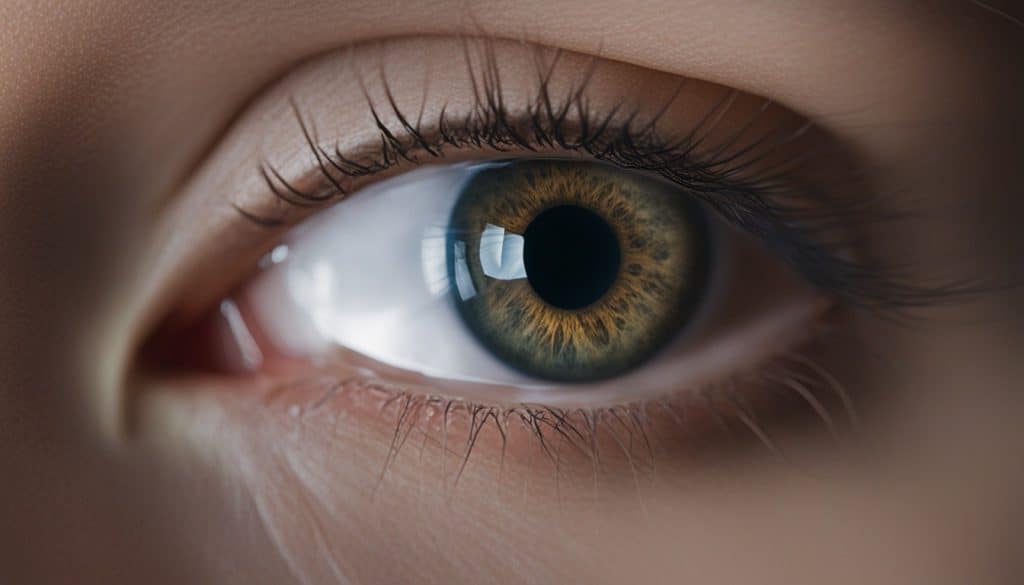Have you ever seen tiny specks or cobwebs moving in your vision after cataract surgery? EYE FLOATERS AFTER CATARACT SURGERY can make you curious and worried. It's important to know if these floaters are normal or if they could be a sign of a problem for your VISION HEALTH.
Many people see floaters after cataract surgery. Getting an ARTIFICIAL LENS is meant to improve your vision. But sometimes, floaters can appear. It's important to understand why they happen and what they might mean for your eyes. This knowledge helps protect your eyes and enjoy your clear vision.

Key Takeaways
- Understanding the nature of EYE FLOATERS AFTER CATARACT SURGERY is key to post-operative care.
- Determining the normalcy of floaters versus signs of a complication contributes to overall VISION HEALTH.
- The significance of being aware of changes in vision and seeking advice for any EYE CONDITION post-surgery.
- Educating yourself about the potential causes and implications of EXPERIENCING FLOATERS.
- The importance of discussing any vision changes with your ophthalmologist after the insertion of an ARTIFICIAL LENS.
What Are Eye Floaters and How Do They Relate to Cataract Surgery?
Have you seen small, drifting spots in your vision after cataract surgery? These are called eye floaters. Let's explore what they are, why they might be more noticeable after surgery, and the important roles of the vitreous and retina.
Defining Eye Floaters
Eye floaters look like transparent, squiggly lines or dark specks moving in your vision. They seem to dart away when you look right at them. They come from the vitreous humor, a gel inside your eyes that can change as you get older.
The Connection Between Cataract Surgery and Floaters
Cataract surgery replaces your cloudy lens with a clear one. This can cause the vitreous to change, leading to more floaters. This is more likely if your vitreous was already changing with age or if the surgery causes PVD (Posterior Vitreous Detachment).
Understanding the Vitreous and Retina's Role
The vitreous keeps your eye's shape and supports the retina. The retina sends light images to your brain. Changes in the vitreous can affect the retina and cause vision problems. If the retina tears or detaches, it can lead to serious vision loss. Seeing new or different floaters after surgery means you should talk to your eye doctor to prevent more problems.
Preexisting Floaters Versus New Floaters After Surgery
It's important to know the difference between old and new floaters after cataract surgery. Old floaters might become more visible after surgery because your vision gets clearer. But, if you see new floaters or they get worse, you should talk to an eye doctor right away.
Identifying Preexisting Floaters
Old floaters might not be noticed until after eye surgery makes your vision clearer. These floaters are usually harmless and don't change much. Keeping track of any eye changes before surgery can help talk to your eye doctor.
Recognizing New Floaters Following Cataract Surgery
New floaters after cataract surgery could mean something's changed in your eye. They can look like dots or strings and might make you see flashes of light. Don't ignore these signs.
When to Contact Your Eye Doctor
| Type of Floaters | Characteristics | Immediate Actions |
|---|---|---|
| Preexisting Floaters | Less distinct, noticed pre-surgery | Monitor, discuss during regular exams |
| New Floaters | Clear, noticeable post-surgery, possibly with flashes | Contact eye doctor immediately |
Knowing about different floaters and what they mean can help keep your eyes healthy. Always tell your eye doctor about any new or changing floaters after surgery. This way, your eye health can be checked and taken care of.
Eye Floaters After Cataract Surgery: Causes and Considerations
Understanding the causes of floaters after cataract surgery is key to keeping your vision healthy. Floaters can come from surgery debris or a process called Posterior Vitreous Detachment (PVD). This happens when the vitreous gel in your eye separates from the retina. The surgery method used can affect how many floaters you get and how bad they are.
Floaters are usually not a big deal, but they can warn of a serious complication. If you see more floaters or your vision gets blurry, see your eye doctor right away. This could mean your retina is pulling away from the back of your eye, which needs quick medical care.
| Cause of Floaters | Common Signs | Action Required |
|---|---|---|
| Surgical Debris | Visual disturbances post-surgery | Consultation with eye doctor |
| Posterior Vitreous Detachment | Increased floaters, flashes of light | Immediate medical evaluation |
| Retinal Detachment | Shadow or curtain over vision field | Urgent medical treatment |
If you're unsure if your floaters after cataract surgery are normal, watch your vision closely. Talk to your healthcare provider about what to do next. Knowing about these issues and acting early can keep your eyes healthy.
Posterior Vitreous Detachment: A Common Culprit
If you've seen changes in your vision after cataract surgery, Posterior Vitreous Detachment (PVD) might be the reason. This condition often leads to new or more noticeable eye floaters. Knowing how PVD affects your eyes and what symptoms to watch for can help you manage it well.
The Role of PVD in Eye Floaters
Posterior vitreous detachment happens when the vitreous, a gel-like substance in your eye, starts to shrink and move away from the retina. This can make particles visible, looking like eye floaters. These floaters are usually harmless but can sometimes mean a more serious eye issue, like retinal detachment.
Symptoms of Posterior Vitreous Detachment
The main signs of PVD are more eye floaters and flashes of light. These flashes happen when the vitreous pulls on the retina. Watching for these symptoms is important because they can also mean retinal detachment is starting. This is a serious condition that needs quick medical help.
Risks Associated with PVD After Cataract Surgery
Even though PVD is usually harmless, it can raise your risk of getting retinal tears or detachment after cataract surgery. If you see a lot more floaters or flashes of light, you should get your eyes checked by a doctor. This is to make sure there are no complications.
Always be careful with any changes in your vision after surgery. Talk to your doctor about any worries to keep your eyes healthy.
| Condition | Symptoms | Urgency of Treatment |
|---|---|---|
| Posterior Vitreous Detachment | New or increased eye floaters, flashes of light | Monitor and consult if symptoms increase |
| Retinal Detachment | Blurred vision, shadow over visual field | Immediate medical attention needed |
Signs and Symptoms of Retinal Detachment
Retinal detachment is a serious condition that can cause permanent vision loss if not treated quickly. It can happen after a tear in the retina, often after eye surgery. Knowing the early signs can help prevent vision damage and protect your sight. Learn these symptoms to act fast.
Early signs include more flashes and floaters. These can look like sudden sparks of light or tiny shadows moving in your vision. Also, if your peripheral vision gets worse or feels blocked, it could mean retinal detachment.
If you don't get treatment, losing your sight can happen fast. Watching for these changes and seeing a doctor quickly can really help.
| Symptom | Description | Immediate Action |
|---|---|---|
| Floaters | Small shapes that float in your vision | Consult your doctor immediately if any of these symptoms occur suddenly or worsen quickly. |
| Flashes | Sudden flashes of light in one or both eyes | |
| Vision Loss | Reduced visibility, especially in the peripheries, potentially progressing to more severe vision impairment |
If you see any of these signs, act fast to avoid permanent vision loss. Your eye doctor will do tests to see if you have retinal detachment. They will then decide how quickly and what treatment you need.
Monitoring Changes in Your Vision After Cataract Surgery
After cataract surgery, it's key to watch your vision closely for any signs that might mean you need more care. Changes in your vision can often be the first clue about how your eyes are healing. By paying attention to these changes, you can work with your ophthalmology team for the best care.
Observing Changes in Floaters
It's important to keep an eye on any changes in eye floaters after cataract surgery. Some floaters are normal after surgery, but a big increase or changes in their pattern means you should talk to your eye doctor.
The Importance of Regular Eye Exams
Regular eye exams are key to seeing how well you're recovering and spotting any post-surgery problems. These exams are crucial in ophthalmology to check the health of your eye after surgery and confirm the success of the cataract surgery. Always follow up with your specialist as advised.
Flashes of Light and Changes in Peripheral Vision
Watch out for flashes of light or changes in peripheral vision too. These signs can mean serious issues like retinal detachment, which needs quick medical help.
| Sign | Normal Post-Surgery Observation | Potential Warning Sign |
|---|---|---|
| Floaters | A few transient specs or strings | A sudden increase in number or dramatic changes in appearance |
| Flashes of Light | Occasional, mild | Frequent or intense flashes |
| Peripheral Vision | Slightly altered directly after surgery | Persistent worsening or loss of side vision |

When to Seek Immediate Medical Attention
If you see signs of a serious eye problem after cataract surgery, you must seek immediate medical attention. Spotting these signs early can stop vision loss.
Look out for sudden floaters, flashes of light, or a shadow moving across your vision. These could mean you have a retinal tear or detachment. Also, if you see your vision getting blurry or more floaters, call your doctor right away.
| Symptom | Possible Condition | Action to Take |
|---|---|---|
| Rapid increase in floaters | Potential Retinal Detachment | Contact your eye doctor immediately |
| Persistent flashes of light | Possible Retinal Issue | Seek immediate medical advice |
| Shadow or gray curtain across vision | Signs of Retinal Tear | Urgent medical evaluation needed |
| Sudden decrease in visual clarity | Could be severe PVD or Detachment | Visit an emergency room or clinic |
Remember, acting fast is key to protecting your vision. If you notice any symptoms, don't wait. Your eyesight and health depend on it.
State-of-the-Art Surgical Techniques and Their Effects on Floaters
Advances in eye surgery have changed how doctors treat eye problems, especially floaters after surgery. These new techniques offer better precision and better results after surgery. By looking into modern surgeries like laser cataract surgery and vitrectomy, doctors can tailor treatments to fit your needs. This might help reduce floaters.
Laser Cataract Surgery: A New Era of Eye Care
Laser cataract surgery uses advanced technology for precise cataract removal with little harm to the eye. This method makes removing cataracts easier and reduces the risk of floaters after surgery. Talking to your eye doctor is key to see how this tech can help your specific situation.
Understanding Vitrectomy and Its Impact on Eye Floaters
Vitrectomy removes part or all of the vitreous humor to get rid of floaters. When done with cataract surgery, it clears the cloudy lens and removes floaters. The success of vitrectomy depends on the surgery method and the doctor's skill. Choosing an experienced eye specialist is crucial.

The Influence of Surgical Technique on Post-Operative Floaters
Each surgery technique has its own effects on healing and the chance of getting floaters after surgery. The precision and type of surgery matter a lot. Talking with your eye doctor about these can help you make a smart choice for your eye health.
Treatment Options for Persistent Floaters After Surgery
If you have floaters after cataract surgery, it's important to know about the treatment options available. These floaters can make it hard to see clearly. But, there are ways to get rid of them. Laser surgery and vitrectomy are two treatments that can help you see better.
Laser surgery breaks up floaters into smaller pieces. This makes them less noticeable. A vitrectomy removes the vitreous gel where floaters come from. This can be a more lasting solution. It's important to talk to your eye doctor about the risks and benefits of each treatment to choose the right one for you.
| Treatment Type | Description | Risks | Benefits |
|---|---|---|---|
| Laser Surgery | A minimally invasive procedure targeting the floater directly with a laser. | Potential eye irritation or temporary increase in floaters. | Less recovery time, no need for incisions, and floater size reduction. |
| Vitrectomy | Removal of vitreous gel that can contain debris causing floaters. | Higher risk including infection, retinal detachment. | Potentially complete resolution of floaters. |
Talk to your eye care professional about persistent floaters if they're bothering you. Whether it's laser surgery or a vitrectomy, the aim is to make your life better by improving your vision.
Conclusion
As we conclude our look at eye floaters after cataract surgery, it's clear they're usually not a cause for worry. They are often part of the healing process. Always focus on improved vision after cataract surgery with thorough post-operative care. Floaters are usually safe, but watch for any changes in your eye health closely. The American Academy of Ophthalmology offers great advice and guidelines during recovery.
Keep in touch with your eye doctor and quickly check any strange symptoms. This helps you take care of your vision after cataract surgery. If floaters don't go away or get worse, don't wait to schedule an appointment with your eye care expert. They can tell you if it's normal or if you need more checks. Your eye health is very important, and talking about any post-surgery worries early helps keep your vision great for life.
Your watchfulness and action after surgery can greatly affect your eye health. Stay updated, keep an eye out, and know your eye care team is there to help you. By knowing about normal eye floaters and when they might be a sign of something serious, you're in the best spot for quick and full recovery.

